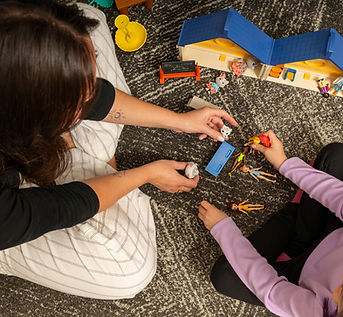How Counselling Works
If you are a first-time therapy client, or it's been a minute since you last attended, here are some question and answer topics to help ease the process.
If you have specific questions that aren't answered below, feel free to connect with your client care specialists (587-714-2412).
First Steps Once You’ve Decided to Start Therapy
Deciding to begin therapy is a powerful and positive choice, congratulations on taking this step toward your well-being! Here’s what you can expect as you get started:
-
Reach Out: Contact us by phone, email, or through our online booking system to schedule your first appointment. We’re happy to answer any initial questions you may have.
-
Read up on therapists ' bios to get an idea of fit. You can also read blogs that they have written to gauge their personality and specialty.
-
Complete Intake Forms: Before your first session, you’ll receive some simple paperwork to fill out. This helps your therapist understand your background and current needs so they can prepare to support you best.

Preparing for your First Session
Starting counselling is a courageous and important step—one that we want to make as comfortable and empowering as possible. To help you feel ready for your first session, here are a few suggestions:
-
Reflect on Your Goals: Think about what brought you to counselling and what you hope to achieve. There are no right or wrong answers—just what feels important to you right now.
-
Consider Your Story: You don’t need to share everything all at once, but it can help to have a sense of your background, relationships, or recent experiences you’d like to explore.
-
Prepare Questions: Feel free to jot down any questions or concerns about therapy, the process, or what to expect. Your therapist is here to support you and answer any questions you have.
-
Be Kind to Yourself: It’s normal to feel a mix of emotions before your first session. Remember, this is your space to be heard, without judgment, at your own pace.

How does Therapy Work?
Counselling, as with most things, can be intimidating the first time. The good news is that we only have 1 first time!
In the initial session, the Counsellor will review your intake form and get to know you a bit better. They may ask questions about your home life, work life, relationships, hobbies, interests, etc. At some point in your initial session, the counsellor and you will identify areas of opportunity or concerns that you would like to address. Those identified areas will be the goals of treatment going forward. You can always add new goals, alter goals or remove goals as needed!
Subsequent sessions will work towards giving the client a toolbox filled with interventions and strategies that can be used outside of the session.

How Many Session will I need?
Duration and specific sessions needed to resolve a specific concern are dependent are various factors. There is no one-size-fits-all answer to this question. Some of the independent factors can include the type of therapy and intervention, the number of goals, etc.
To put it simply, it is like asking how long it will take you to get somewhere. Factors such as speed, route, unforeseen issues (accidents and construction), and ultimately...how motivated are you to get there?
It is rare for complex issues to resolve in one or two sessions.

Myth's & Realities
Myth 1: Counselling is only for people with serious problems.
Reality: Counselling is for anyone seeking support, whether you’re dealing with major challenges or simply want to improve your well-being, relationships, or coping skills. It’s a resource for growth, not just crisis.
Myth 2: Therapy will make me relive all my painful experiences.
Reality: Therapy is a safe space where you control the pace and depth of what you share. Your therapist guides you with care, and you only explore what feels right for you.
Myth 3: I have to talk about my past for therapy to work.
Reality: While past experiences can be important, therapy often focuses on understanding your present feelings and developing tools for your current life. It’s about what helps you now and moving forward.
Myth 4: Counselling is a quick fix.
Reality: Healing and growth take time and collaboration. Therapy is a process tailored to your unique journey, with lasting benefits that develop over time.
Myth 5: I have to share everything or be perfect in therapy.
Reality: There’s no perfect way to do therapy. It’s a judgment-free zone where honesty, openness, and your willingness to try are what matter most.

